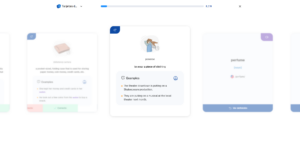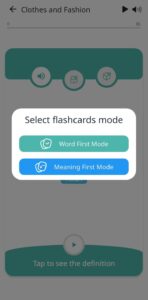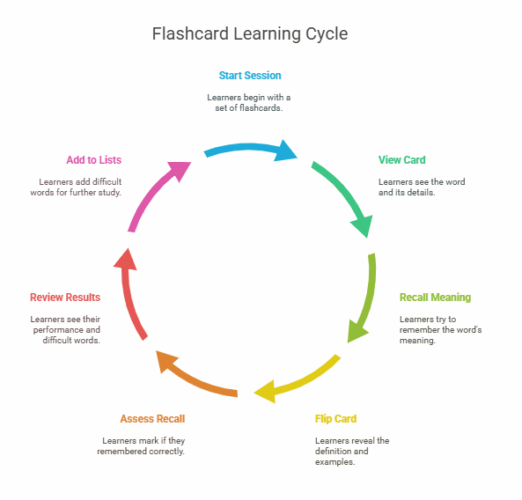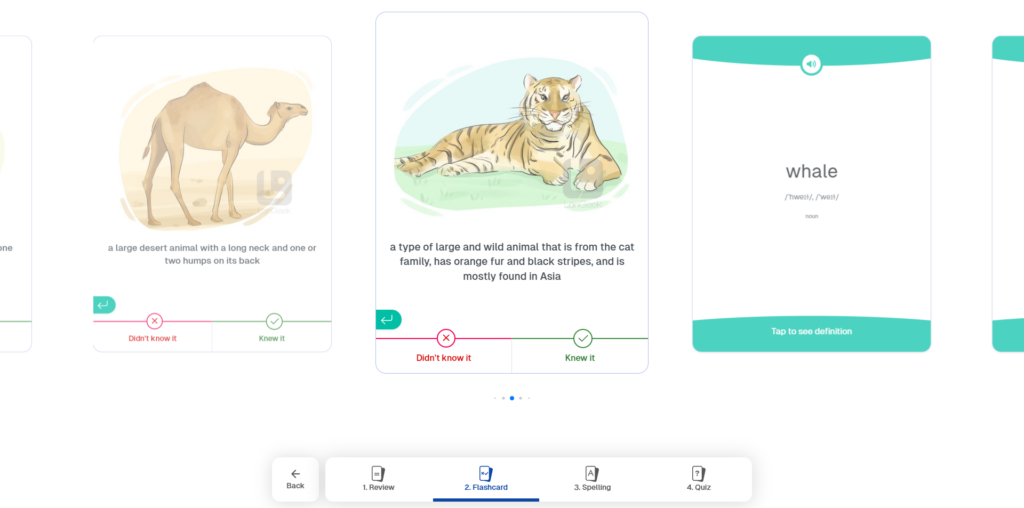The Flashcards feature is the second step in LanGeek’s four-step vocabulary learning system. After reviewing words in the Vocabulary Review section, learners use Flashcards to test their knowledge and assess whether they can recall the meaning of each word. This step helps learners focus solely on word meanings, reinforcing their memory and identifying words that need more practice.

How LanGeek Flashcards Work
When learners start a flashcard session, they are presented with a series of cards, each displaying one word. The front side of the card includes:
-
The word itself
-
Its part of speech (noun, verb, adjective, etc.)
-
Pronunciation in the International Phonetic Alphabet (IPA)
-
A button to hear the word’s pronunciation
Learners are tasked with recalling the meaning of the word before flipping the card. Upon flipping, they see:
-
A translation (if a language is selected)
-
Example sentences showcasing how the word is used
-
Two buttons: “Correct” if they recalled the meaning, or “Incorrect” if they did not
If a learner marks a word as “Incorrect”, it will return to the end of the queue and appear again later in the session. This continues until all words are correctly remembered at least once.
At the end of the session, a results page shows how many times a learner struggled with each word. Words marked as difficult can be added to Daily Words for long-term review or to a Personal Wordlist for further practice.
Flashcards in the LanGeek Mobile App
 The LanGeek mobile app works in a similar way to the web version of the Flashcards feature, but with added flexibility. In the mobile app, learners can choose between two modes:
The LanGeek mobile app works in a similar way to the web version of the Flashcards feature, but with added flexibility. In the mobile app, learners can choose between two modes:
-
Word-First Mode (Standard Flashcards): In this mode, learners are shown the word and are expected to recall its meaning, just like in the web version.
-
Meaning-First Mode (Reversed Flashcards): In this mode, learners are shown the meaning of the word first and must guess the word, which helps reinforce word recall in a different way.
Once a session in one mode is completed, learners are offered the option to practice using the other mode. This additional level of reinforcement helps deepen the connection between the words and their meanings, boosting retention.
The mobile app thus provides a more dynamic flashcard experience, allowing learners to strengthen both passive and active recall through two different modes of review.

How Flashcards Fit into LanGeek’s Learning System
Flashcards are designed to facilitate short-term repetition. Unlike Daily Words, which uses a Leitner-based spaced repetition system for long-term retention, flashcards focus on rapid review, helping learners filter out words they haven’t yet mastered.
To ensure long-term retention, LanGeek recommends combining Flashcards with Daily Words. While Flashcards help learners quickly reinforce what they know, Daily Words schedules words for review at optimal intervals, solidifying them in long-term memory.
Can Learners Create Their Own Flashcards?
Flashcards are automatically generated for each wordlist. However, learners who want to focus on specific words can create a Personal Wordlist, which includes its own set of flashcards. This allows for customized practice tailored to the learner’s needs.
Effectiveness of Flashcards in Language Learning
Research supports the effectiveness of flashcards in vocabulary learning, particularly when they promote active recall. A study by Kornell & Bjork (2008) found that self-testing with flashcards can enhance learning, provided that students do not prematurely discard items they think they know. This supports the idea that active recall strengthens memory retention more effectively than passive review methods, such as rereading lists.
Additionally, the concept of desirable difficulties suggests that learners should engage with challenging words and review them regularly. This approach improves word retention by promoting deeper processing. Flashcards are an excellent tool for this, helping learners focus on words they find difficult and enabling them to mix these challenging words with others they already know.
By integrating LanGeek’s Flashcards feature with the Daily Words Leitner system and Personal Wordlists, learners can strengthen their vocabulary and improve their ability to recall words over the long term.
FAQs
No, it does not currently give you the option to shuffle cards while using flashcards.
Flashcards focus on rapid, short-term review to help you reinforce vocabulary quickly. In contrast, the Daily Words system uses spaced repetition to review words at optimal intervals, ensuring long-term retention. Combining both features allows you to strengthen your vocabulary efficiently.


